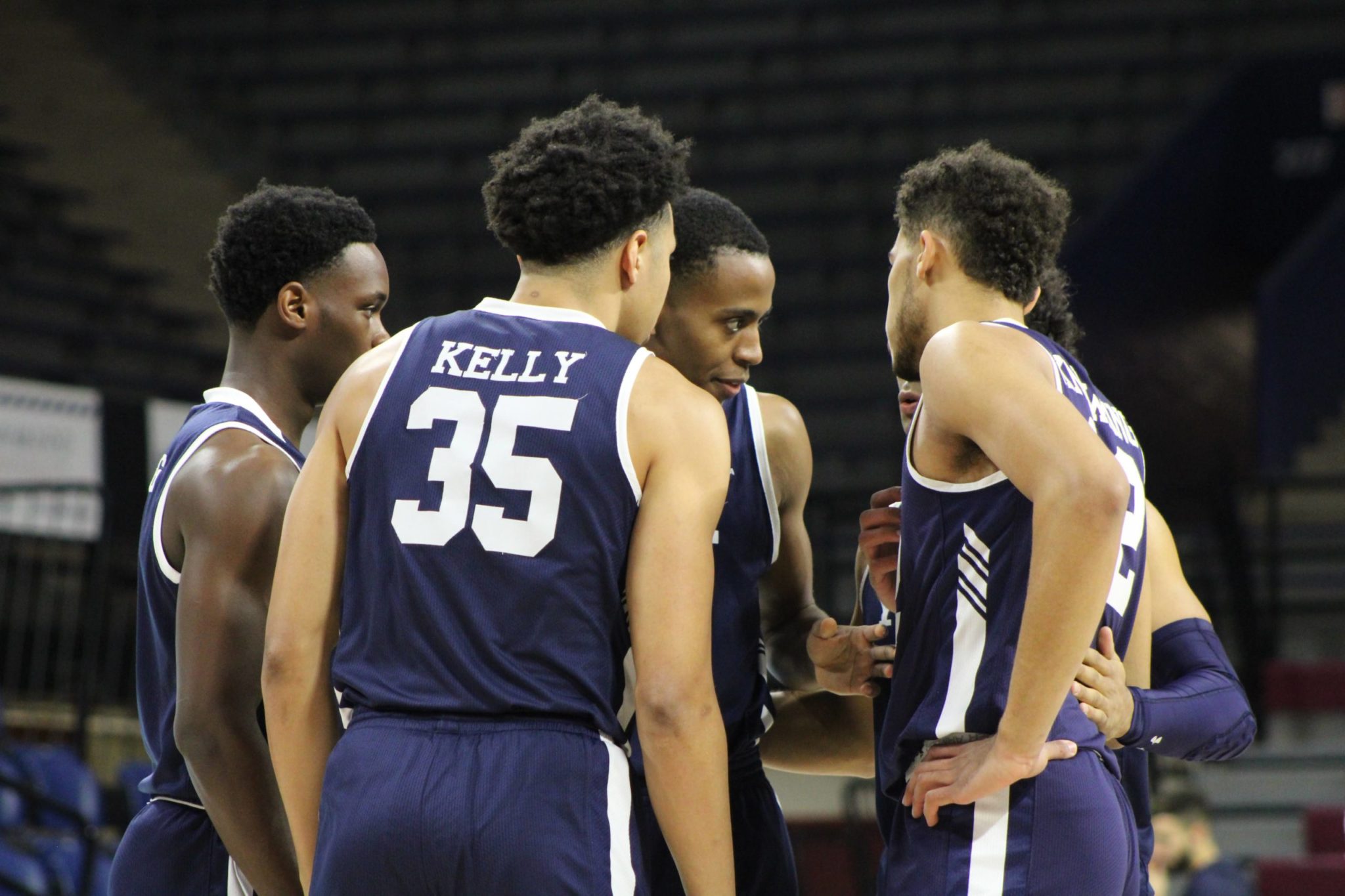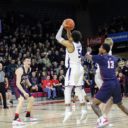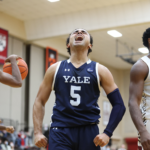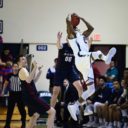MEN’S BASKETBALL: Behind Dingle’s 31 points, Penn hands Yale first Ivy loss
Yale cut Penn’s lead to one in the second half, but offensive missteps in the first and a big game from last season’s Ivy League Rookie of the Year, Jordan Dingle, prevented the Bulldogs from completing their comeback at the Palestra Saturday. Penn won 76–68.

William McCormack, Contributing Photographer
PHILADELPHIA — With less than two minutes to go in the Yale men’s basketball team’s Saturday afternoon matchup at Penn, Quakers guard Jordan Dingle had already netted 26 points despite missing all seven of his three-point attempts.
Yale (8–9, 2–1 Ivy) trailed 66–62 after a bucket from its starting forward Matt Knowling ’24, but Dingle, a Penn (7–12, 4–2) sophomore who scored 14 of his eventual 31 points in the final seven minutes of the game, now had the ball in his hands on the other end with 1:40 to play. Using a screen set by teammate and forward Michael Moshkovitz, Dingle pulled up to launch his eighth three-point attempt of the day — and this one was the first to fall.
“I gave us the kiss of death,” Yale head coach James Jones told the News postgame. “I said that he was 0-for-seven from the arc and then he makes his eighth one.”
Across the gym, speaking to reporters in the media room tucked under the Palestra bleachers, Dingle said he noticed Yale started going under ball screens and handoffs in the second half and took issue with the tactical change: “I wanted to show them that listen, you can’t do that every time against me,” he said. “It may be a bad [three-point shooting] game, but I’m not a bad shooter.”
The converted triple pushed Penn’s lead to seven and sealed a 76–68 win for the Quakers. Yale guard and captain Jalen Gabbidon ’22, who led his side with 21 points, managed to deflect a Penn pass attempt and poke one ball out of bounds after Yale applied a late full-court press, evoking foggy memories of the six steals and 13 unanswered points the Elis notched to beat Penn with a frenzied press the last time the two schools met in Feb. 2020.
But no such miracle comeback crystallized on Saturday, even though Yale’s steady second-half climb nearly returned it the lead for the first time since the game’s first three minutes. After trailing by a dozen at the break, the Bulldogs sliced the deficit to one on two separate occasions midway through the second half, but Penn leaned on Dingle to secure its fourth Ancient Eight win. Offensive missteps in the first half and a subpar shooting day from deep did not help the Elis’ cause.

“We didn’t really handle our business offensively in the first half,” Jones said before listing areas where he thought the offense fell short. “They were real physical, and we didn’t get calls at the rim. We didn’t finish; we missed a bunch of layups. We had a couple of plays where we were running and guys were in the wrong spots because they were not mentally focused enough, so those things happen sometimes, and you can’t expect to do that and win a game.”
Jones, tracing his finger through the free throw column of the final box score, also pointed out that Yale missed several free throws late in the second half. The Bulldogs shot 12 of 19 from the line in the second and missed four of their five free-throw attempts between the under-four media timeout and the end of the game. Yale forward Isaiah Kelly ’23, who entered the game a 61.5 percent free-throw shooter, made two of a season-high nine attempts.
The Bulldogs struggled in a similar way in the second half at Brown last Monday, making 12 of 23 attempts in the second half as Brown fought to come back. Yale hung on to win 66–63, making the missed shots meaningless. In a role reversal with Yale trailing on Saturday, the misses hurt: “If you make your free throws, it’s a different game,” Jones said.
“And again, we miss two free throws and then he bangs a three,” the 23rd-year head coach added when discussing Dingle’s late-game three-pointer. “You make the two free throws, he’s feeling good … it’s just, it’s all connected.”
Penn head coach Steve Donahue raised a similar observation about free throws during his postgame press conference, noting that his team’s 17-of-20 mark from the foul line was a big force behind the Quakers’ win.

In the first half, Yale’s offense looked far less formidable than it did a weekend ago, when the Bulldogs scored a season-high 96 points on 20 assists against Cornell. At Penn, the Elis missed all seven of their three-point attempts and recorded just eight made field goals in the first half. Penn led 35–23 at halftime.
Though Penn entered the game statistically ranked as the worst rebounding squad in the Ancient Eight, an early advantage on the boards also helped the Quakers build their first-half lead. They grabbed eight offensive boards compared to Yale’s four in the first and ended the frame with 24 total rebounds, putting them on pace to collect fifteen more than their season average of 33.1. (Yale’s rebounding margin recovered as it came back in the second half, and the Elis ultimately snagged just two less than Penn, thanks in part to Kelly’s career-high 11; both teams finished with 10 offensive boards.)
Neither side shot well from deep as both teams ended the game less than 20 percent from three-point range. Yale’s three-of-19 mark was its second poorest three-point shooting performance of the season, only ranking better than its clip at Seton Hall in November.
Instead, the Bulldogs found success driving to the hoop as they steadily clawed back to start the second. A Gabbidon drive and five free throws from Swain cut Penn’s lead to 37–30 less than two minutes into the new half. A few minutes later, with 14:50 to play, another strong take from the Yale captain — this time, an and-one — meant the Bulldogs were only down three, 42–39.
“I thought for a stretch of the game, towards the middle they just kept driving it,” Donahue said. “I think they were really testing us, and I thought it was effective … Besides that, I thought we guarded well throughout the game.”

The Yale bench brought energy too, unleashing chants of “de-fense, de-fense” and on one possession, successfully convincing Penn forward Moshkovitz to attempt a rushed turnaround layup after a premature shot clock countdown. Knowling scooped up the rebound, and guard Matthue Cotton ’23 pulled up for a jump shot on the other end, shaving Penn’s lead to one for the first time all half, 50–49, with nine minutes remaining.
A pair of Gabbidon free throws brought the score to 52–51 a couple minutes later, but that was the closest Yale got. From that point on, Dingle — who entered the game averaging 18 points per game, good for second in the Ivy League behind Swain and his 19.1 — made six of his last seven shots. His 31 points matched a career-high, while his 13 made field goals (on only 24 attempts) set a new career best. Jones said he thought Yale did a poor job defending a dribble handoff to which Penn frequently returned, allowing Dingle to move off a screen and down the middle with his dominant right hand.
“Yale’s a really good team,” Dingle said. “But in this league, it could be anybody’s day … It’s important to get the ones at home in front of your own fans, the few that we could have.”
The Quakers have now won five in a row over Yale at the Palestra, which opened in 1927 and is often considered the “Cathedral of College Basketball.” The Bulldogs’ last victory in the historic arena came during the postseason, when Yale beat Harvard, 73–71, in an inaugural 2017 Ivy Madness semifinal.
With a capacity of 8,722, the facility is the largest Ivy League basketball gym, but attendance was listed at only 125. Due to COVID-19, Penn is not currently permitting the general public to attend games but is allowing a “limited number of guests” of home and visiting team student-athletes and coaches to attend.
Alongside Gabbidon, forward Matt Knowling ’24 and guard Azar Swain ’22 also scored in double figures for Yale with 13 and 12 points, respectively.










